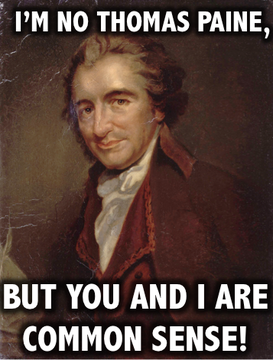Federalist Paper #10
AMONG the numerous advantages promised by a well-constructed Union, none deserves to be
more accurately developed than its tendency to break and control the violence of faction . . . By
a faction, I understand a number of citizens, whether amounting to a majority or a minority of
the whole, who are united and actuated by some common impulse of passion, or of interest,
adversed to the rights of other citizens, or to the permanent and aggregate interests of the
community. There are two methods of curing the mischiefs of faction: the one, by removing its
causes; the other, by controlling its effects. There are again two methods of removing the
causes of faction: the one, by destroying the liberty which is essential to its existence; the
other, by giving to every citizen the same opinions, the same passions, and the same interests.
It could never be more truly said than of the first remedy, that it was worse than the disease.
Liberty is to faction what air is to fire, an aliment without which it instantly expires. But it could
not be less folly to abolish liberty, which is essential to political life, because it nourishes
faction, than it would be to wish the annihilation of air, which is essential to animal life,
because it imparts to fire its destructive agency. The second expedient is as impracticable as the
first would be unwise. As long as the reason of man continues fallible, and he is at liberty to
exercise it, different opinions will be formed. As long as the connection subsists between his
reason and his self-love, his opinions and his passions will have a reciprocal influence on each
other; and the former will be objects to which the latter will attach themselves. The diversity in
the faculties of men, from which the rights of property originate, is not less an insuperable
obstacle to a uniformity of interests. The protection of these faculties is the first object of
government. From the protection of different and unequal faculties of acquiring property, the
possession of different degrees and kinds of property immediately results; and from the
influence of these on the sentiments and views of the respective proprietors, ensues a division
of the society into different interests and parties . . . The inference to which we are brought is,
that the CAUSES of faction cannot be removed, and that relief is only to be sought in the means
of controlling its EFFECTS . . .
From this view of the subject it may be concluded that a pure democracy, by which I mean a
society consisting of a small number of citizens, who assemble and administer the government
in person, can admit of no cure for the mischiefs of faction . . . A republic, by which I mean a
government in which the scheme of representation takes place, opens a different prospect, and
promises the cure for which we are seeking . . . The two great points of difference between a
democracy and a republic are: first, the delegation of the government, in the latter, to a small
number of citizens elected by the rest; secondly, the greater number of citizens, and greater
sphere of country, over which the latter may be extended. The effect of the first difference is,
on the one hand, to refine and enlarge the public views, by passing them through the medium
of a chosen body of citizens, whose wisdom may best discern the true interest of their country,
and whose patriotism and love of justice will be least likely to sacrifice it to temporary or partial
considerations . . . Hence, it clearly appears, that the same advantage which a republic has over
a democracy, in controlling the effects of faction, is enjoyed by a large over a small republic,—is
enjoyed by the Union over the States composing it.

